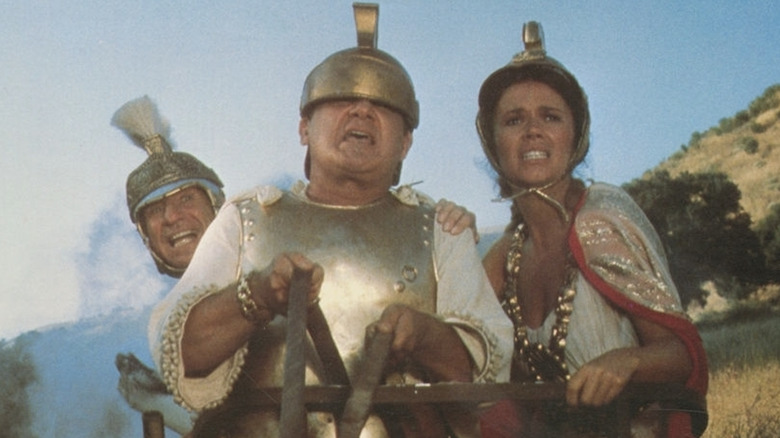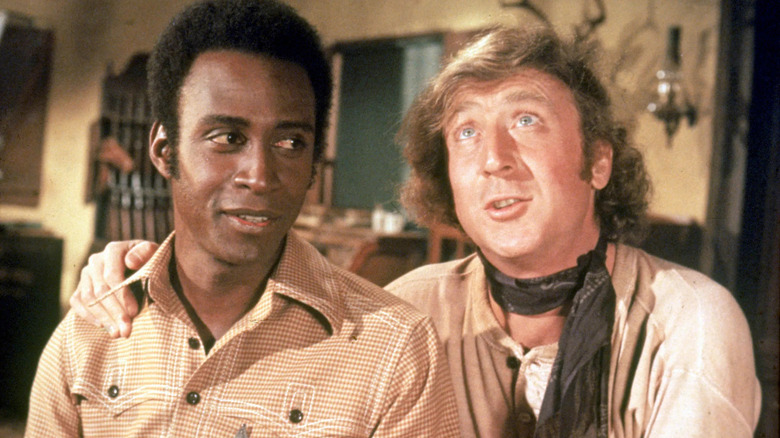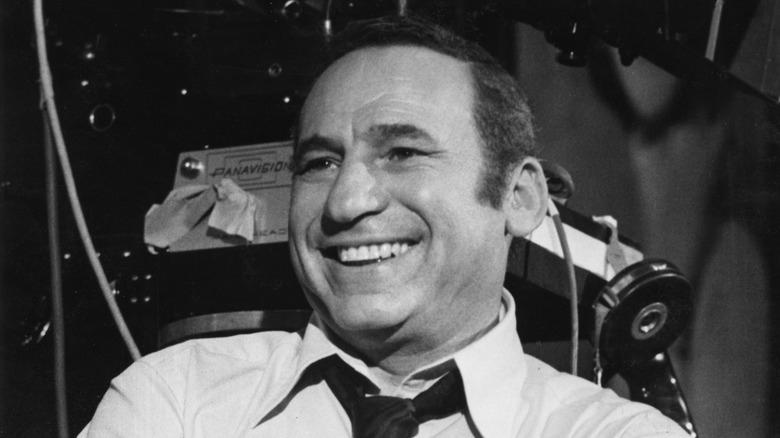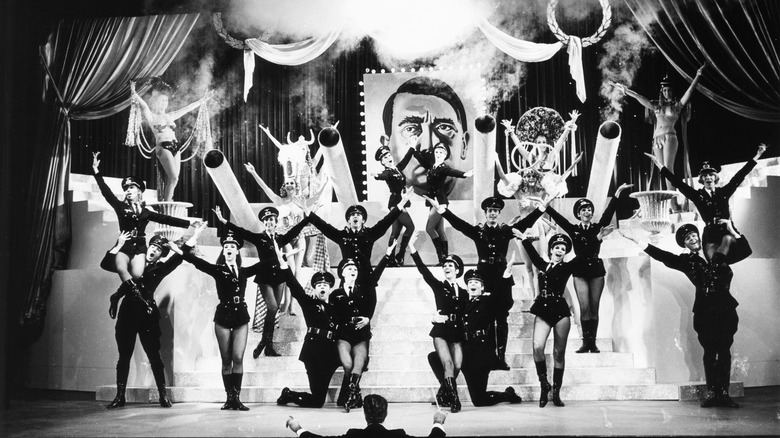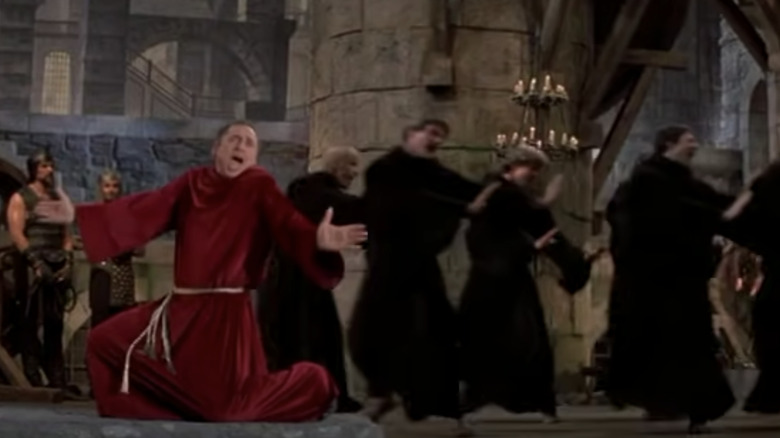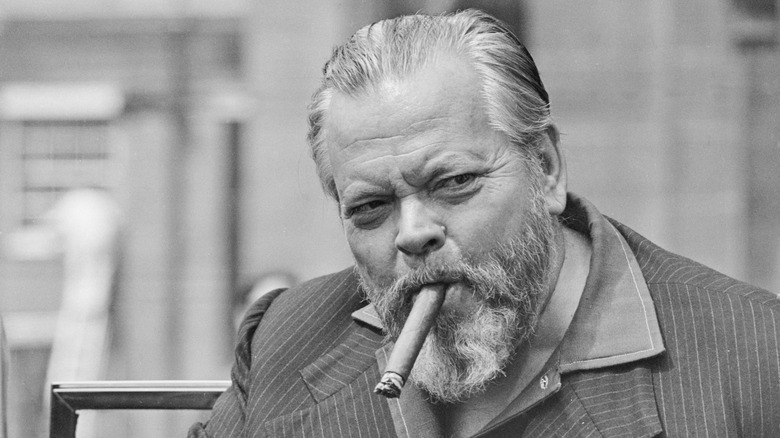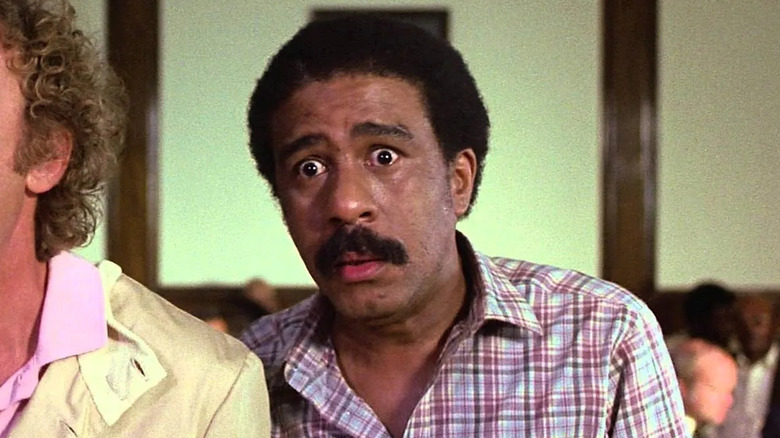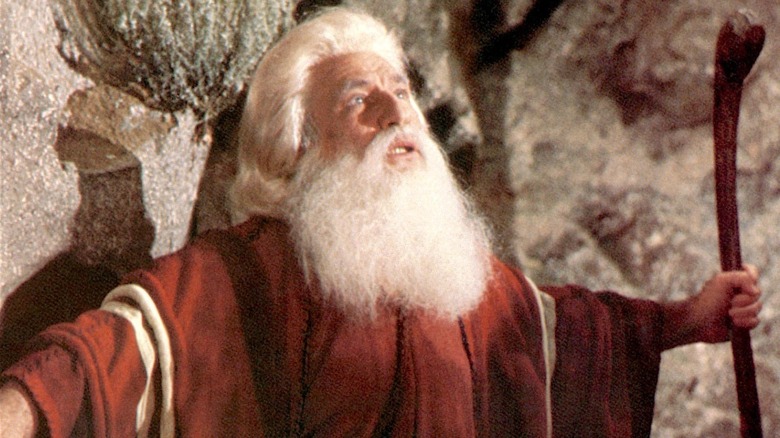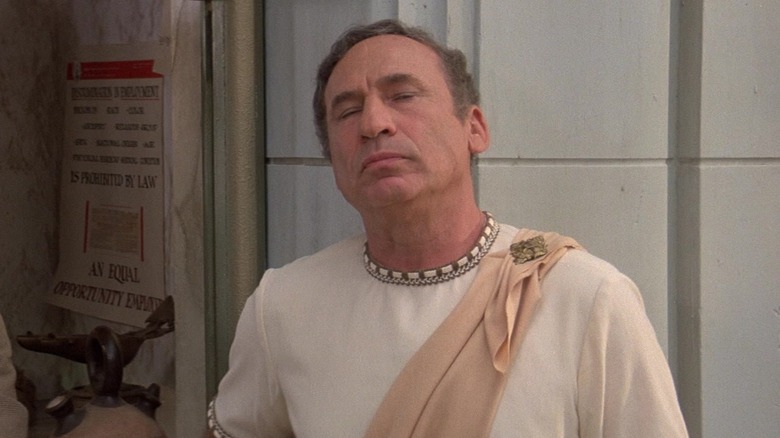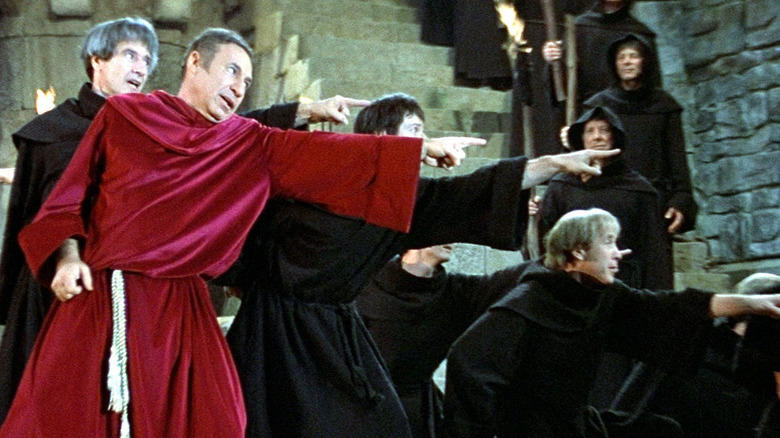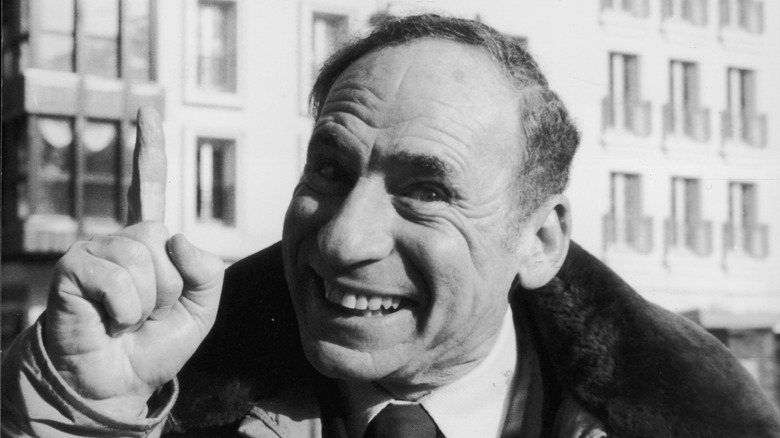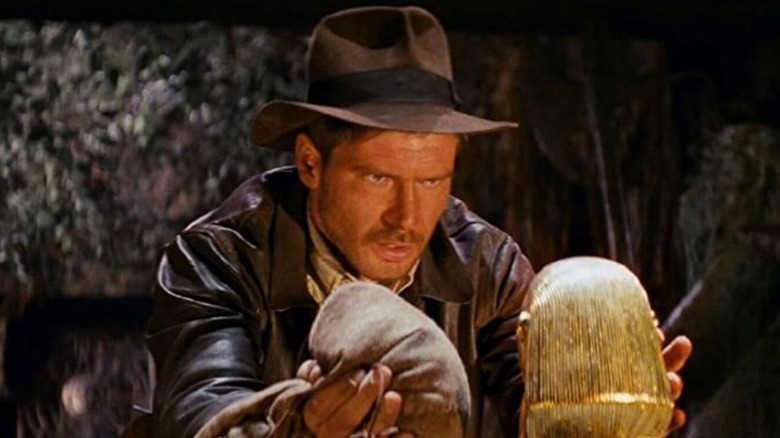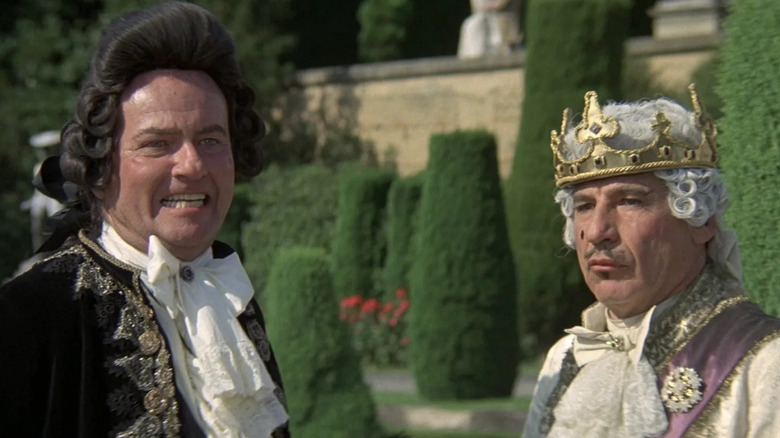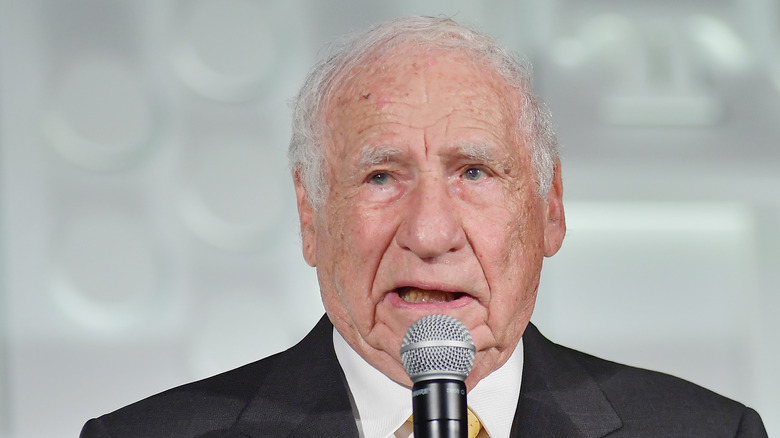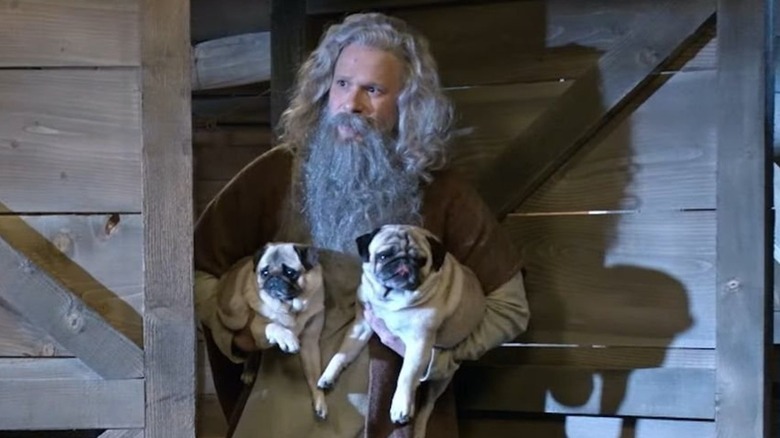History Of The World: Part I: 14 Facts About Mel Brooks' Comedy Classic Only Major Fans Will Know
These days, there's no shortage of sequels, reboots, remakes, and re-releases. The trend has even carried over to legendary comedy filmmaker Mel Brooks, who is finally delivering on a long-awaited joke.
"History of the World: Part I" was released in 1981, capping a string of successful, classic Brooks comedies. It was an ambitious project, even for the guy who made a flamboyant musical centered on Adolf Hitler, sparing no expense as he once again directed, wrote, produced, and starred in a film, this one purporting to tell the tale of... well ... everything.
Forty years later, Brooks is following up on the jokey "Part I" in that title by teaming up with the likes of Nick Kroll, Wanda Sykes, and Ike Barinholtz for "History of the World: Part II," a Hulu series which covers historical eras untouched by the film's predecessor. Now feels like the ideal time to rewind and take a look at what made Brooks' first epic so iconic, especially if "Part II" leads to the endless future sequels that Brooks fans would undoubtedly love to see.
Mel Brooks spent the '70s spoofing film genres
Brooks was destined for comedy since the day he was born in 1926 on his family's kitchen table. The future director served in World War II, but when he returned to the United States he got right to work pursuing a career in comedy. Eventually he was hired by comedian Sid Caesar and became part of a legendary "Your Show of Shows" writer's room that included Woody Allen, Neil Simon, and Carl Reiner. Brooks made his way up the comedy ranks, eventually co-creating the hugely successful 1960s Bond-era spoof "Get Smart" with Buck Henry. This knack for spoofing genre material would soon blossom further, as Brooks turned his talents towards filmmaking.
By the end of the 1970s, Mel Brooks had written and directed six films. There was the musical satire "The Producers" (which Brooks would adapt into a hugely-successful Broadway production in the ”00s, and then a movie musical), the Western parody "Blazing Saddles," and horror comedy "Young Frankenstein" (the latter being a favorite of Quentin Tarantino). By the late-'70s, Brooks' had cornered the market in creating parodies of popular film genres; even his "Silent Movie," which parodied films that predated the invention of sound, multiplied its budget by 9.
"High Anxiety," Brooks' last films of the 1970s, was a parody of Hitchcockian horror, and the first film to star Brooks in a lead role (aside from his non-speaking part in "Silent Movie"). By the time the 1980s rolled around, Mel Brooks had experienced lots of success, but his ambitions were growing even larger. He had done Westerns, horror, musicals, and thrillers, but there was one genre Brooks was still eager to try his hand at: historical epics.
History of the World was a spontaneous idea
Fortunately for Brooks, his best ideas typically spawned out of spontaneous bouts of inspiration. The genesis for "The Producers" came during a press conference for a musical Brooks wrote in 1962 called "All American." When asked what his next project would be, Brooks off-the-cuff replied "Springtime for Hitler"; the joke stuck in Brooks' mind for years, particularly as he began to develop the idea that would eventually become "The Producers."
"History of the World: Part I" had a similar origin. In a 1981 interview with The New York Times, Brooks said he was on the 20th Century Fox studio lot when he ran into a former crew member from "High Anxiety" who, again, asked what his next project would be. Brooks, perhaps too ambitiously, declared he would be making the biggest movie ever made, called "History of the World." When challenged in the moment that it would be impossible to cover the entire history of the world in one movie, Brooks quipped, "You're right, maybe I'll call it 'History of the World: Part I.'"
As Brooks began to seriously consider "History of the World: Part I" as his next film, the project raised many potential questions about what historical events he would cover. Soon enough, the film began to construct itself as a series of sketches taking place in significant moments from the Dawn of Man to the French Revolution.
Brooks made a career of laughing at the unfunny
Brooks' first film, "The Producers" would be a sign of the career to come. The comedy follows a desperate Broadway producer (Zero Mostel) and his accountant (Gene Wilder), who attempt to scam investors by producing a musical designed to close on opening night, a musical tribute to Adolf Hitler written by a deranged ex-Nazi. As expected, Hollywood studios were hesitant to distribute a film like "The Producers," which paints Hitler in a comic light, but Brooks eventually got financial support from independent financier Sidney Glazier.
Years later, critic Roger Ebert would recount an exchange he witnessed that pretty much summed up Brooks' attitude during this period. Ebert was on an elevator with Brooks and wife Anne Bancroft in New York when a woman got on. Recognizing the filmmaker, she said of "Producers": "I have to tell you, Mr. Brooks, that your movie is vulgar." Brooks replied: "Lady, it rose below vulgarity."
Covering a topic like antisemitism in a comedic satire was ambitious for Brooks, but it was the only way he knew how to tackle such serious subject matter. As he told NPR in 2018, he wasn't interested in debating anti-Semites but that "if you can make fun of [Hitler], if you can have people laugh at him, you win."
Brooks carried this approach over to his future films, particularly "Blazing Saddles" and its depiction of racism in Hollywood. When the film recently incited retrospective controversy, celebrities like Whoopi Goldberg adamantly defended it. "History of the World: Part I" would be a different beast altogether, as Brooks' film was set to parody religion, foreign cultures, and other potentially controversial historical events. As "History of the World: Part II" collaborator Nick Kroll told the Television Critics Association, "Mel's ultimate goal was to poke fun at those in power."
The film's budget was Brooks' highest yet
In the 1960s, the historical epic film was a common, albeit expensive, genre. Films like 1962's "Lawrence of Arabia" and 1963's "Cleopatra" often ran for well over 3 hours, and historical epics like "Spartacus," "Ben-Hur" and "The Ten Commandments" were among the most expensively-produced films of their time. Brooks also wasn't the first person to come up with an idea that would take the wind out of their sails; in 1979, "Monty Python's Life of Brian" spoofed Biblical film adaptations with a budget around $4 million.
For Brooks' "History of the World: Part I," he'd aim a little higher than the Python troupe. The film cost an estimated $11 million to produce, which exceeded the budgets on his previous films substantially. In fact, the film cost about as much to produce as his previous three films combined: "High Anxiety" at $4 million, "Silent Movie" at $4 million, and "Blazing Saddles" at $2 million.
Much of this budget was allotted to one sequence in particular: The Spanish Inquisition. A stunning 10% of the film's entire budget was reportedly spent on this musical sequence that invoked Busby Berkeley musical showstoppers. It's a sequence quite similar in tone to "Springtime for Hitler," turning the horrific religious genocide of the Spanish Inquisition into a catchy, Broadway-worthy spectacle. Looking back decades later, it's easy to see such Brooks lunacy as a progenitor of everything from "South Park" to "Hamilton" to "Hamlet 2."
Orson Welles perfected the art of comedic narration
Orson Welles was a legend by 1981, having moved well beyond his wunderkind years but nevertheless respected as the mastermind behind what could be the best film ("Citizen Kane") and radio program ("War of the Worlds") ever produced, all before turning 27. An actor, filmmaker and part-time magician, Welles was also blessed with a profound, baritone voice for the ages (still in demand today); Brooks was determined to land him for "History of the World: Part I." If Brooks was to have a narrator for his historical epic, he wanted the best voice he could get.
Luckily for Mel Brooks, Welles (now in his sixties, notoriously low on funds and struggling to get various long-gestating films completed) agreed to do the film's narration for $25,000. Hey, it had to be better than schilling for frozen peas and wine.
Nevertheless, Brooks came to regret even paying Welles that much. As he told The Hollywood Reporter in 2020, the director was slated to do five days' worth of voice recording sessions, but he had perfected all of his lines in just a few short hours. When Brooks asked Welles what he would spend the $25,000 on, Welles allegedly replied "Cuban cigars and Sevruga caviar."
Ultimately, "History of the World: Part 1" would be among Welles' final performances, along with such fare as "The Muppet Movie" and "Transformers: The Movie." The legendary filmmaker and actor died in 1985.
Richard Pryor dropped out of the film
When it comes to comedy in the '70s and '80s, few figures were as prominent (or controversial) as Richard Pryor. Often considered one of the greatest stand-up comedians of all time, Pryor made a successful transition from stand-up comedy to film acting, starring in films like "Superman III," "The Toy" and "Harlem Nights." Pryor was also a co-writer for Mel Brooks' "Blazing Saddles" in 1974, with the director initially wanting him to play the lead role of Sheriff Bart.
Unfortunately, studio executives weren't keen on having Pryor (who had yet to become a movie leading man) in their movie, despite repeated pleas from Brooks. The Bart role went to Cleavon Little, and the rest is history.
But it wouldn't be the last time Pryor was unable to act for Brooks. By the early '80s, Pryor had become a Hollywood tour-de-force, carrying films like "Stir Crazy" and "Silver Streak" alongside Brooks favorite Wilder. Having proven Brooks right about his leading man talents, the comedian was set to cameo in "History of the World, Part 1" as Josephus, a slave to the Romans. But this time around, it wouldn't be studio interference that would keep Pryor from appearing in a Brooks film.
Famously, during production of "Stir Crazy" in 1980, Pryor went on a freebasing binge, dousing himself in rum and lighting himself on fire before running through the streets of Los Angeles while being chased by police (via Washington Examiner). Somehow, the comedian survived (and went on to joke about the event) against all odds. But he was unable to appear in "History of the World, Part 1" as a result, leading to Gregory Hines replacing him as Josephus.
The Moses scene came from on set inspiration
Considering the scope for "History of the World: Part I," Brooks had to cut corners when he could, even with his epic budget. One of the film's most famous scenes came from an impromptu inspiration — with a little re-arranging, Brooks realized he and his crew could re-purpose their caveman set for the Moses scene.
Casting himself as Moses was an easy choice for Brooks. While considering historical events to focus on, he picked out Moses as one of the most interesting characters from Bible. Furthermore, Brooks just happened to fit the same robes Charlton Heston had worn in the 1956 religious epic "The Ten Commandments."
The scene, as it plays out in the movie, finds Moses returning from the mountaintop with three stone tablets, announcing to the chosen people that God has bestowed upon them fifteen commandments. Then he accidentally drops one, leaving them with only ten. Fortunately for Jewish audiences, Jewish Humor Central transcribed the Hebrew text on the third tablet as having entries such as "Thou shall not laugh" and "Thou shall not break."
Brooks copied one of his heroes to play a funny philosopher
Mel Brooks plays several characters in "History of the World: Part I." Aside from historical figures like Moses, Torquemada (the Grand Inquisitor of the Spanish Inquisition), and King Louis of France, one of the most notable characters that Brooks plays is a parody of a Greek philosopher in the Roman Empire sketch, named Comicus. As his name suggests, Comicus combines elements of historical philosophers with stand-up comedians, though Brooks' inspiration for his performance was far more specific.
"It's Good To Be King: The Seriously Funny Life of Mel Brooks," written by James Robert Parish and released in 2007, was a biography detailing Brooks' life and work. In the book, Brooks recounts his inspiration for Comicus coming from comedic screen legend Eddie Cantor. The musician/actor was known for his work on Broadway and in compositions, though for Comicus, Brooks essentially stole Cantor's comedic mannerisms. As he says in the book, "My 'Comicus' was a tribute to Eddie Cantor. He was my timing, my excitement."
Referencing Eddie Cantor in the Roman Empire sketch was its own Easter egg for fans of the actor. In 1933, Cantor starred in "Roman Scandals," which cast Cantor as a man transported back to Imperial Rome. The film is a classic Busby Berkeley-choreographed musical, one of many that inspired several classic Brooks scenes in his filmography.
A seasoned composer teams up with Brooks for The Inquisition
By far the biggest, grandest scene in "History of the World: Part I" is the Spanish Inquisition sequence, which turned the European religious genocide into a Busby Berkeley-esque dance number led by Brooks as Torquemada, the red robed Grand Inquisitor. For some, it's the most thrilling, hilarious scene in the entirety of the film; for others, it's a moment that rises below vulgarity just a crudely as "Springtime for Hitler." As The Times of Israel wrote in 2021 regarding the sequence, the number is in "a tough competition for the most joyfully tasteless segment."
However, no critic can deny the amount of effort put in by Brooks and his ensemble of dancers. Brooks wasn't alone in composing the music; the scene was notably the first collaboration between Mel Brooks and Broadway composer Ronny Graham, who he would later reunite with while working on the films "To Be or Not to Be" and "Spaceballs." Graham also appears in the "Spanish Inquisition" sequence as "Jew #2," who describes the torture he endured at the hands of the Grand Inquisitor.
Sadly, Graham passed away in 1999, meaning he and Brooks won't be reuniting for a grand musical show-stopper in "History of the World: Part II." Trailers for the Hulu series seem to suggest, however, that at least one musical number in the new installment will feature Jack Black.
One cut joke referenced a nuclear disaster
Leave it to Mel Brooks to find out where the line is — and then cross it. One sequence in "History of the World: Part I" was planned to reference a modern event at the time: The Three Mile Island accident, a nuclear reactor meltdown which took place in Pennsylvania in 1979, only two years before the film's release.
In the scene, as Brooks explained to critic Gene Siskel during an interview, two characters were fused with a dog and a cat, the supposed result of a nuclear meltdown. However, early audiences were not a fan of the moment. At least one critic saw the scene in an extended cut of the movie; Gary Arnold wrote in his review for the Washington Post in June 1981 that the Three Mile Island scene was "almost awesome in its lack of comic point." Nevertheless, audiences never saw it, as Brooks ultimately left it on the cutting room floor.
Though Brooks ultimately decided to not push this particular envelope any further, that audience rejection didn't dilute his tolerance for once again touching the third rails of comedy. As he told Entertainment Weekly in 2017, "Comedy has to walk a thin line, take risks."
History of the World had an unlucky opening weekend
Against all odds, "History of the World: Part I" was released theatrically on June 12, 1981, the seventh film written and directed by Brooks. It faced stiff competition at the box office — both "Raiders of the Lost Ark" and "Clash of the Titans" debuted that same weekend, and "History" finished fourth overall, also behind the returning "Cheech and Chong's Nice Dreams."
It grossed just under $5 million for its opening weekend, which was the highest opening for a Brooks film but underwhelming nonetheless. Its opening was weakened by poor word-of-mouth, and the film ultimately grossed $31 million overall during its theatrical run. While that was triple its budget, it would take time, nostalgia and the legacy of Brooks to finally earn the film a sequel some four decades later.
Critics were divided on whether the movie was good
Initial critical reactions to "History of the World: Part I" were mixed. One review from Roger Ebert was unsparing of Brooks, despite the critic having enjoyed previous films like "Blazing Saddles" and "The Producers." "This time, the things he's trying to get away with aren't funny," Ebert wrote. "There is, for example, the movie's tiresome series of jokes about urination. There must be comic possibilities in the subject (and he finds one when he shows a Stone Age critic's method of reviewing a cave painting), but there is nothing inherently funny about urination, and Brooks proves it here, again and again."
Variety compared it negatively to "Monty Python's Life of Brian." When critics did stick up for it, such as Chicago Reader's Jonathan Rosenbaum, the praise was mixed. "The wonderful stuff is so funny that it makes most of the awful stuff tolerable," he wrote.
Time has served the film well, however. When Salon published a celebration of the film's 40 year anniversary, writer Matthew Rozsa argued that some of the film's more vulgar and tasteless jokes can be seen as educational.
"Look at a throwaway gag in which a Roman inventor excitedly hawks his new invention, indoor plumbing, by trying to blow people's minds at the mere idea of something that can "pipe the s**t right out of your house!" This one always make me guffaw because it works on two levels," he wrote. "The joke involves toilet humor and naughty words, to be sure, but indoor plumbing truly was a revolutionary invention when it came to personal hygiene. The gag here isn't just the use of vulgarity; it is the fact that one of the great moments of human technological progress involved something that can easily be reduced to a potty joke."
As time moves on, History of the World inspires comedy writers
Nowadays, "History of the World" is regarded by some as a generation-defining comedy. This is true for many comedy writers, such as Michael Price, who has worked on "The Simpsons" since 2003. In an article for Salon celebrating "History of the World: Part I," Price said that watching the film "[brings] back a lot of warm memories" for someone like him who grew up on Brooks' films.
Another famous fan of "History" is Larry Charles, co-creator of "Curb Your Enthusiasm" with Larry David. In the same Salon article, Charles cited Brooks as a kindred spirit to the "Seinfeld" staff, with "History" serving as a tentpole of Jewish-American comedy. Other retrospective articles have commended the film for furthering Brooks' expertise in vulgar humor, which the director would continue with "Spaceballs" in 1987.
Perhaps the greatest testament to the staying power of "History" is the Hulu sequel series, which features an ensemble cast of comedians who grew up on Brooks and his work. In many ways, the series feels like a labor of love for a revered hero.
Modern-day comedians team with Brooks for the series
"History of the World: Part II" has been a long time coming, arriving some 42 years after the original film, but Mel Brooks isn't getting mellow in his old age. Brooks co-wrote the series with multiple modern-day comedy talents, including Wanda Sykes, Nick Kroll, and Ike Barinholtz, all known to push a few envelopes of their own.
The four will also star in the series, whose cast includes Johnny Knoxville (reportedly playing Rasputin), Lauren Lapkus, Quinta Brunson, David Duchovny, Hannah Einbinder, Taika Waititi and Timothy Simons, as well as Sarah Silverman, Seth Rogen, Richard Kind, Dove Cameron and Danny DeVito.
The eight-part series covers much more ground than "Part 1," including the invention of the telephone with Alexander Graham Bell (played by Barinholtz), Harriet Tubman's Underground Railroad, and Jake Johnson of "New Girl" fame playing Marco Polo. Now, as always, it's a good time to be a fan of Mel Brooks.
